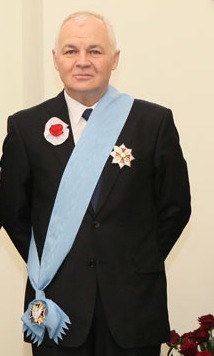Jan Krzysztof Bielecki
| Jan Krzysztof Bielecki | |
|---|---|
 |
|
| Prime Minister of Poland | |
|
In office 12 January 1991 – 5 December 1991 |
|
| President | Lech Wałęsa |
| Deputy | Leszek Balcerowicz |
| Preceded by | Tadeusz Mazowiecki |
| Succeeded by | Jan Olszewski |
| Personal details | |
| Born |
3 May 1951 Bydgoszcz, Poland |
| Political party |
Solidarity Citizens' Committee (1988–1991) Liberal Democratic Congress (1991–1994) Freedom Union (1994–2001) Civic Platform (2001–present) |
| Alma mater | University of Gdańsk |
| Religion | Roman Catholicism |
| Awards |
|
Jan Krzysztof Bielecki ['jan ˈkʂɨʂtɔf bʲɛˈlɛt͡skʲi] (born 3 May 1951) is a Polish liberal politician and economist. A leading figure of the Gdańsk-based Liberal Democratic Congress in the early 1990s, Bielecki served as Prime Minister of Poland for most of 1991. In his post-political career, Bielecki served as president of Bank Pekao between 2003 and 2010, and presently serves as the chairman of the Polish Institute of International Affairs. Since the early 2000s, Bielecki has been a member of the Civic Platform party. In 2010, the Warsaw Business Journal described Bielecki as one of the most respected economists in Poland.
Born in Bydgoszcz on 3 May 1951, Bielecki studied sea transport economics at the University of Gdańsk, graduating in 1973. For much of the latter half of the 1970s, Bielecki was employed as an economist at the Center of Heavy Industry, an applied economic research institute in Gdańsk. In 1980, Bielecki joined the Solidarity movement, taking an active role in the movement by providing it with logistical support. As martial law was declared in December 1981 to crush dissidents, Bielecki was arrested and briefly detained by authorities. Recognized for his role in Solidarity, Bielecki was fired from the Center of Heavy Industry and blacklisted from state employment. After eight months of unemployment, Bielecki found a job as a truck driver for an agricultural cooperative, while also secretly remained active in Solidarity by publishing pamphlets and monitoring clandestine police activities for the movement. During a forum held at the London School of Economics in 2009, Bielecki described the difficulty many fellow Solidarity activists faced during the early 1980s. "After martial law, a lot of people—colleagues of mine—were [on] their knees or in regular prison. Unfortunately, 70 percent of them decided to leave the country because they thought, 'The fight is over. It's the end. There is no chance for the future.' And we tried in a hopeless way to stay in the country, in my personal view, mostly not to give up and to fight for pride."
...
Wikipedia
